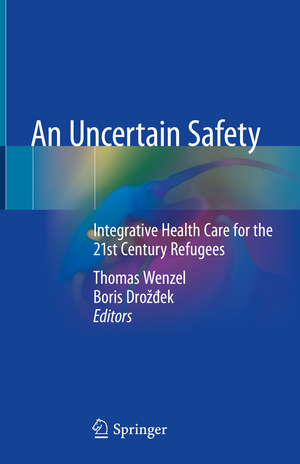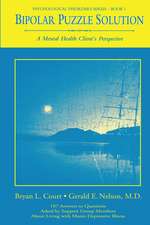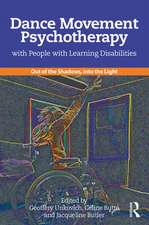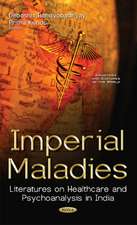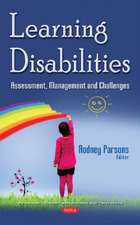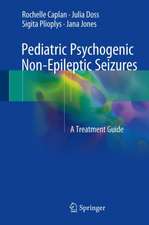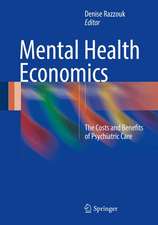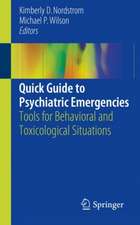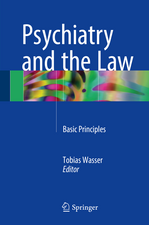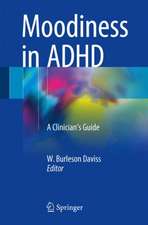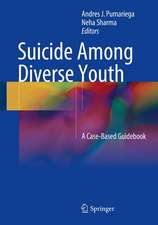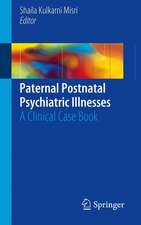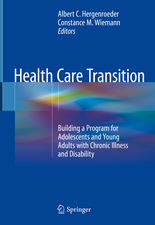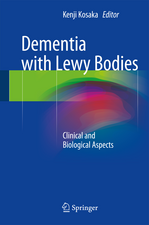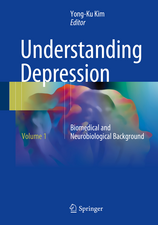An Uncertain Safety: Integrative Health Care for the 21st Century Refugees
Editat de Thomas Wenzel, Boris Drožđeken Limba Engleză Hardback – 7 aug 2018
Issues covered include an overview of current health challenges in the new refugee crises: medicine and mental health in disaster areas, long-term displacement and mental health, integration of legal, medical, social and health economic issues, children and unaccompanied minors, ethical challenges in service provision, short and long-term issues in host countries, models of crises intervention, critical issues, such as suicide prevention, new basic and “minimal” intervention models adapted to limited resources in psychosocial and mental health care, rebuilding of health care in post-disaster/conflict countries, training and burn-out prevention.
The book was developed in collaboration with the World Psychiatric Association, and is endorsed by Fabio Grandi (UN High Commissioner for Refugees), Manfred Nowak (former UN Special Rapporteur for Torture), and Jorge Aroche (President of IRCT).
| Toate formatele și edițiile | Preț | Express |
|---|---|---|
| Paperback (1) | 848.48 lei 38-44 zile | |
| Springer International Publishing – 25 ian 2019 | 848.48 lei 38-44 zile | |
| Hardback (1) | 866.15 lei 38-44 zile | |
| Springer International Publishing – 7 aug 2018 | 866.15 lei 38-44 zile |
Preț: 866.15 lei
Preț vechi: 911.74 lei
-5% Nou
Puncte Express: 1299
Preț estimativ în valută:
165.73€ • 173.51$ • 137.14£
165.73€ • 173.51$ • 137.14£
Carte tipărită la comandă
Livrare economică 02-08 aprilie
Preluare comenzi: 021 569.72.76
Specificații
ISBN-13: 9783319729138
ISBN-10: 3319729136
Pagini: 400
Ilustrații: XXIX, 442 p. 13 illus., 7 illus. in color.
Dimensiuni: 155 x 235 x 27 mm
Greutate: 0.86 kg
Ediția:1st ed. 2019
Editura: Springer International Publishing
Colecția Springer
Locul publicării:Cham, Switzerland
ISBN-10: 3319729136
Pagini: 400
Ilustrații: XXIX, 442 p. 13 illus., 7 illus. in color.
Dimensiuni: 155 x 235 x 27 mm
Greutate: 0.86 kg
Ediția:1st ed. 2019
Editura: Springer International Publishing
Colecția Springer
Locul publicării:Cham, Switzerland
Cuprins
Introduction.- Part 1 The Background to Refugee Movements and Mental Health.- Background: History of Refugees and Public Health.- Background: Interdisciplinary Aspects of the present refugee crises: Global Aspects and the Near East.- Interdisciplinary Aspects of the present refugee crises: Europe.- Creating and preventing violence: An integrated approach.- The role of international health care and political organisations: Changes and limitations.- Ethical and legal standards and challenges.- Overview: vulnerable groups: women and gender based aspects, trafficking.- Part 2 In Crises Regions: Challenges, Short and Long-term Interventions.- Integrative Interventions in crises regions.- Public Health in transitional and permanent camps.- Medical Aspects.- Psychosocial Aspects and vulnerable groups (women, the elderly, children, child soldiers).- Rebuilding Public Health after Man Made Disasters.- Psychosocial health after Violence: Community and group oriented approaches.- Curative and transitional justice in psychosocial reconstruction - what works ?.- Medical Anthropology and Public Health Systems.- Special situations: Places of detention.- Part 3 Host countries – Resources and Challenges.- First time interventions, housing and basic needs.- Medical Aspects of care in host countries.- Psychosocial Aspects and the WHO models, vulnerable groups, unaccompanied minors.- Psychotherapy and psychosocial support: New Models.- Long-Term integration of refugees.- Embedding refugees in health care systems.- Working in transcultural settings and the UNHCR translators models.
Recenzii
“Wenzel (Medical Univ. of Austria) and Drozdek (Summer School of Psychotrauma, Croatia) have edited a collection to assess the global phenomenon of refugees from a health and well-being perspective. They tackle the psychological, legal, and social experiences of the refugees and the host country through a multidisciplinary framework. … Summing Up: Recommended. Advanced undergraduates through faculty and professionals.” (H. Holt, Choice, Vol. 56 (9), May, 2019)
Notă biografică
Thomas Wenzel, MD, is a Psychiatrist and Psychotherapist, and Professor of Psychiatry at the Medical University of Vienna, Austria, working with refugees, and victims of torture and other violent crimes since 1986. He is co-founder of the Hemayat and Wellcome treatment centers for torture survivors, in Vienna, of the transcultural out-patient department at his University, co-founder and past chair of the World Psychiatric Association scientific section on Psychological Aspects of Persecution and Torture, past medical director of the IRCT (International Rehabilitation Council for Torture Victims), served as Secretary General of the International Academy of Law and Mental Health, and is presently chair of the working groups on refugees and pluricultural therapies of the European Association for Psychotherapy and the World Council for Psychotherapy. International research, publications and teaching, especially in the UN Istanbul-protocol and transcultural medicine,and scientific coordination of several EU projects related to stress, trauma and resilience.
Boris Drožđek, MD, PhD is a psychiatrist and psychotherapist with over 25 years of experience in treating victims of war and political violence. He is currently associated with PsyQ/Parnassia group, Netherlands. In addition, he works in his private practice De Hemisfeer and is the international director of the Summer School of Psychotrauma in Dubrovnik, Croatia. Dr. Drožđek publishes in the fields of psychotraumatology and transcultural psychiatry, and teaches and gives training and workshops on a regular basis worldwide. Together with John P. Wilson he has edited the books Broken Spirits: The Treatment of Traumatized Asylum Seekers and Refugees, War and Torture Victims (Brunner-Routledge, New York, 2004) and Voices of Trauma: Treating Survivors across Cultures (Springer, New York, 2007). He is the former board member of NtVP (The Dutch Psychotrauma Society),IRCT (International Rehabilitation Council for Torture Victims) Executive Committee member, and currently a board member of the ISHHR (International Society for Health and Human Rights).
Boris Drožđek, MD, PhD is a psychiatrist and psychotherapist with over 25 years of experience in treating victims of war and political violence. He is currently associated with PsyQ/Parnassia group, Netherlands. In addition, he works in his private practice De Hemisfeer and is the international director of the Summer School of Psychotrauma in Dubrovnik, Croatia. Dr. Drožđek publishes in the fields of psychotraumatology and transcultural psychiatry, and teaches and gives training and workshops on a regular basis worldwide. Together with John P. Wilson he has edited the books Broken Spirits: The Treatment of Traumatized Asylum Seekers and Refugees, War and Torture Victims (Brunner-Routledge, New York, 2004) and Voices of Trauma: Treating Survivors across Cultures (Springer, New York, 2007). He is the former board member of NtVP (The Dutch Psychotrauma Society),IRCT (International Rehabilitation Council for Torture Victims) Executive Committee member, and currently a board member of the ISHHR (International Society for Health and Human Rights).
Textul de pe ultima copertă
This book addresses the psychosocial and medical issues of forced migration due to war, major disasters and political as well as climate changes, in the context of public health and linked to organizational, legal and practical strategies that can offer guidance to professionals, as well as governmental and non-governmental organizations. Both internal and international displacement present substantial challenges that require new solutions and integrated approaches.
Issues covered include an overview of current health challenges in the new refugee crises, medicine and mental health in disaster areas, long-term displacement and mental health, integration of legal, medical, social and health economic issues, children and unaccompanied minors, ethical challenges in service provision, short and long-term issues in host countries, models of crises intervention, critical issues, such as suicide prevention, new basic and “minimal” intervention models adapted to limited resources in psychosocial and mental health care, rebuilding of health care in post-disaster/conflict countries, training and burn-out prevention. The book was developed in collaboration with the World Psychiatric Association.
Issues covered include an overview of current health challenges in the new refugee crises, medicine and mental health in disaster areas, long-term displacement and mental health, integration of legal, medical, social and health economic issues, children and unaccompanied minors, ethical challenges in service provision, short and long-term issues in host countries, models of crises intervention, critical issues, such as suicide prevention, new basic and “minimal” intervention models adapted to limited resources in psychosocial and mental health care, rebuilding of health care in post-disaster/conflict countries, training and burn-out prevention. The book was developed in collaboration with the World Psychiatric Association.
Caracteristici
Presents a comprehensive and interdisciplinary approach to the psychological and medical issues of forced migration Discusses short and long-term challenges and solution models Focuses on both evidence-based and tested, as well as innovative new concepts
